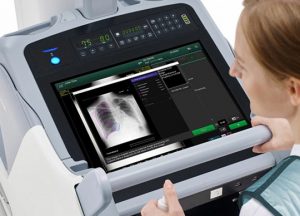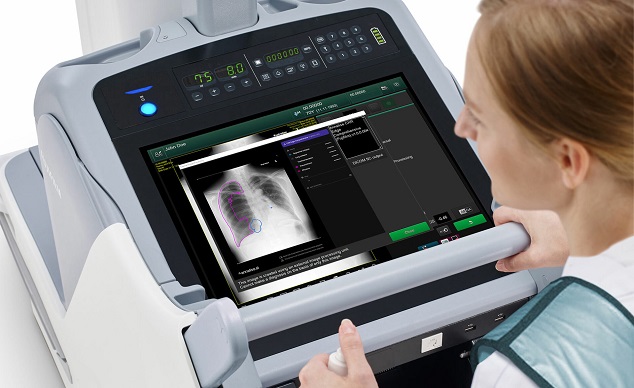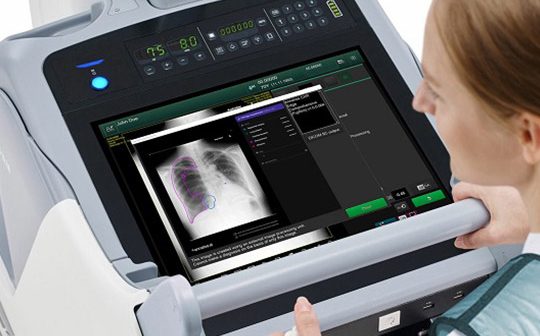

Annalise CXR Edge (Fujifilm) AI solution in action.
As part of its successful transformation from photographic film manufacturer to a company contributing to resolving social challenges with advanced technologies in a wide-range of business fields, Fujifilm Australia has expanded its range of cutting-edge Artificial Intelligence (AI) solutions into the healthcare industry – one of its core businesses.
Fujifilm’s latest foray into the AI sphere is in partnership with Australian-based medical imaging specialists annalise.ai and their CXR Edge solution, one of the world’s leading and comprehensive chest X-ray AI decision-support solutions for mobile and fixed X-ray devices.
Ryuichi Matoba, CEO of Fujifilm Australia Pty Ltd. said, “Fujifilm has been supplying X-ray film to the healthcare industry since 1936, shortly after the foundation of Fujifilm in Japan. Since then, Fujifilm has expanded its Medical Systems business with some significant milestones along the way, such as developing Fuji Computed Radiography, applying the world’s first digital method for digitising X-ray images. In short, Fujifilm wants to create a society where people can live healthily for longer and Fujifilm’s AI technology and our new partnership with annalise.ai both play a major role in supporting those goals.”
As part of its successful transformation from photographic film manufacturer to a company contributing to resolving social challenges with advanced technologies in a wide-range of business fields, Fujifilm Australia has now further expanded its range of cutting-edge Artificial Intelligence (AI) solutions into the healthcare industry – one of its core businesses.
Fujifilm’s latest foray into the AI sphere is in partnership with Australian-based medical imaging specialists annalise.ai and their CXR Edge solution, one of the world’s leading and comprehensive chest X-ray AI decision-support solutions for mobile and fixed X-ray devices.

Fuji Computed Radiography, invented by Fujifilm.
Ryuichi Matoba, CEO of Fujifilm Australia Pty Ltd. said, “Fujifilm has been supplying X-ray film to the healthcare industry since 1936, shortly after the foundation of Fujifilm in Japan. Since then, Fujifilm has expanded its Medical Systems business with some significant milestones along the way, such as developing Fuji Computed Radiography, applying the world’s first digital method for digitising X-ray images. In short, Fujifilm wants to create a society where people can live healthily for longer and Fujifilm’s AI technology and our new partnership with annalise.ai both play a major role in supporting those goals.”
Annalise CXR Edge is a software medical device designed for portable and stationary X-ray devices, intended to assist point-of-care clinicians and radiologists with the interpretation of chest X-rays.
The AI algorithm within the device identifies the presence of the radiological findings and provides a notification of suspected findings in under 10 seconds. Detecting up to 95 clinical findings, it is a comprehensive AI decision-support solution for chest X-rays that is available for mobile and fixed X-ray devices. annalise.ai has developed a specific version of its CXR Edge AI product for use with Fujifilm x-ray systems.
The Annalise CXR Edge (Fujifilm version) is available with Fujifilm’s X-ray devices in Australia and within selected equipment models, in other countries around the world.
Annalise CXR Edge offers a significant suite of findings for chest X-rays. In particular, chest imaging with portable devices is increasing and has an even more important role to play within radiology imaging departments and wards. With significantly increased patient volumes clinicians are under pressure to make quicker decisions.

Fujifilm’s Medical informatics solution where image recognition technologies are used.
Fujifilm Australia and annalise.ai’s new partnership and AI solution now provides the advanced tool set, including decision support, that is vitally needed by clinicians and the wider community.
The new AI solution has already seen results with Fujifilm sending two mobile X-ray devices equipped with Annalise CXR Edge to Tonga and Palau as part of a humanitarian response during the pandemic.
Fujifilm Corporation, Japan, initially created its own open, vendor-neutral platform REiLI to realise a new type of diagnostic imaging workflow, hosting third parties’ AI technologies as well as the company’s own AI technologies. As a result, REiLI not only enabled the collaboration with annalise.ai but made it the logical progression and next step on this journey.
The journey into the world of AI has come as Fujifilm simultaneously pursued and developed superior image processing technologies over the last 80 years. These technologies have now been developed for and applied in the healthcare, medical (and many other) fields and support the diagnostic imaging workflows of many medical institutions in Australia and around the globe.
In fact, today Fujifilm provides over 70 image recognition technologies across industries and continues to develop these technologies.
Fujifilm strives to “improve accessibility to medical services,” as stated in its CSR plan, Sustainable Value Plan 2030. Fujifilm’s AI and IT solutions form core capabilities in fulfilling this task. Fujifilm will work to improve medical accessibility in all 196 countries and regions in the world by introducing medical products and services with AI technologies by 2030.
Fujifilm expects its Medical Systems business to increasingly make up a significant portion of its global sales, targeting JPY700 billion (AUD7.7 billion*) by 2026.
While Fujifilm has long been synonymous with high-quality photographic films, the company has evolved into much more by leveraging its unique technologies cultivated through its photographic film business and continues to grow in healthcare, materials, business innovation and imaging. In Australia, Fujifilm offers a variety of products including medical equipment, industrial materials, graphic systems, recording media, broadcast and cine optical devices, digital cameras, lenses, imaging, and photo printing.






